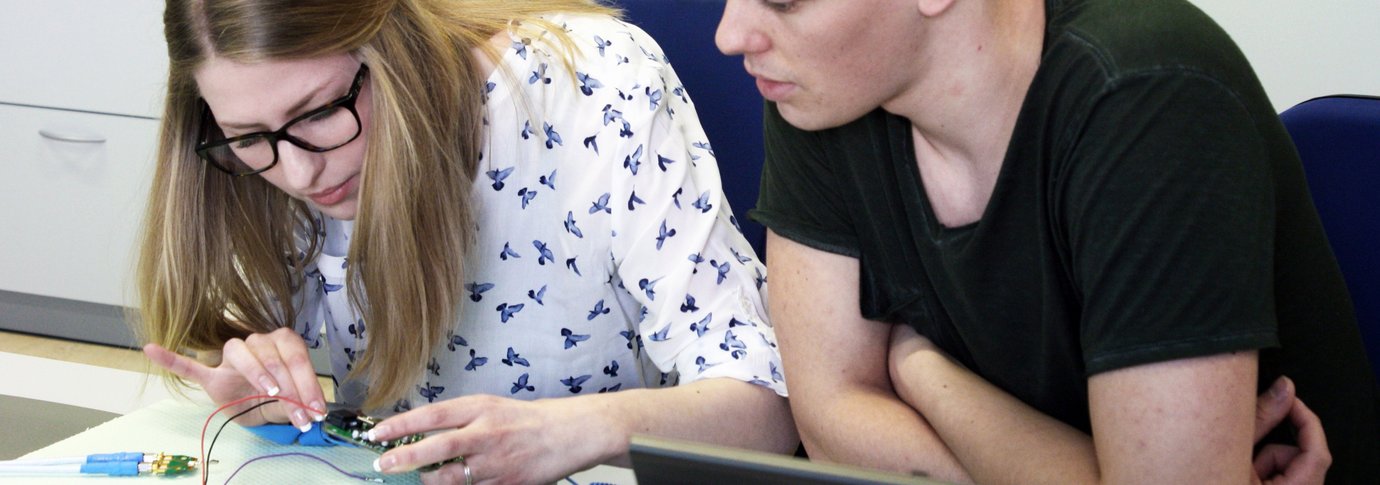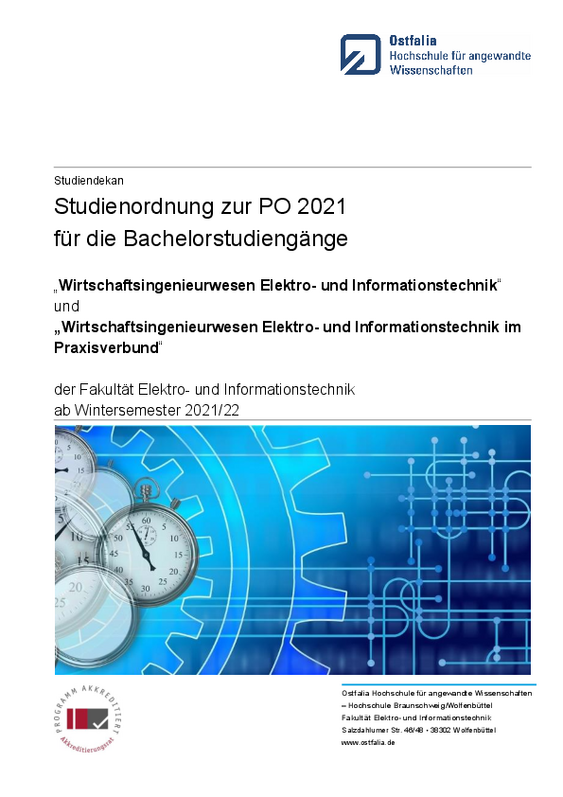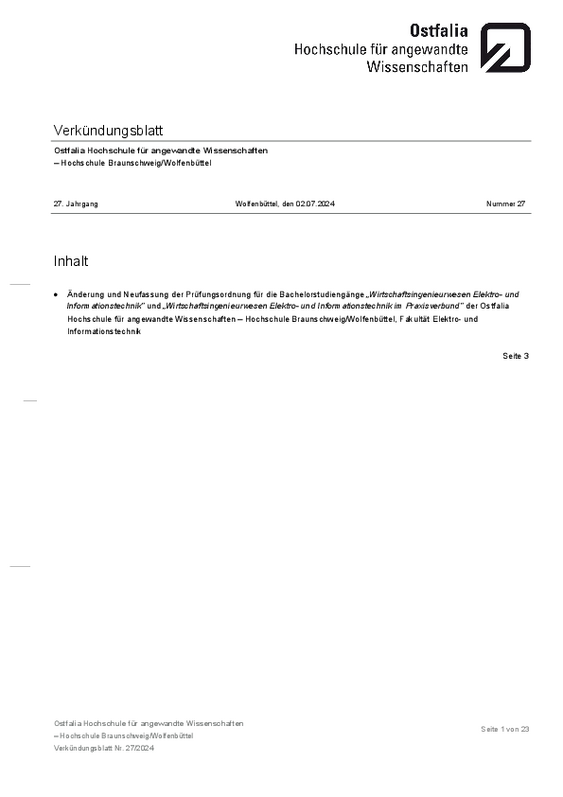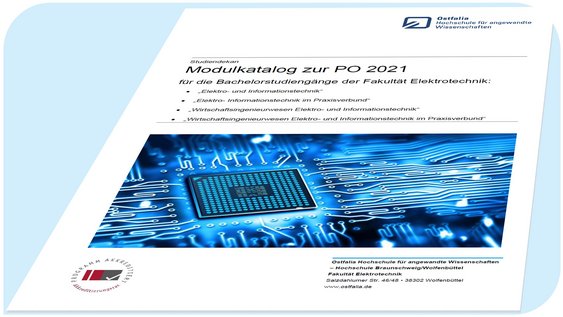Electrical Engineering, Business Administration and Economics - Dual Programme
Do you want to cleverly combine technology and business?
Do you want to improve the world as an engineer with technical solutions, think economically and gain practical experience?
Then Industrial Engineering and Management in Electrical Engineering and Information Technology is just the thing for you! Study forward-looking technology and business topics and gain valuable experience in practical phases at one of over 40 co-operating companies in the region.
Benefit from internship remuneration, top career opportunities and even obtain two degrees in a short space of time if you choose the study programme with vocational training!
Also discover our related degree programmes:
Electrical Engineering and Information Technology – Bachelor's degree programme
Electrical Engineering and Information Technology – Dual Programme – Bachelor's degree programme
Electrical Engineering, Business Administration and Economics – Bachelor's degree programme
Facts at a glance
Apply now!
Secure your place at the Faculty of Electrical Engineering and Information Technology!
To the applicationDetails of the degree programme
Fields of activity
With your Bachelor of Engineering (B. Eng.) degree, you have excellent career and salary prospects. Your areas of work are exciting and varied:
- Hardware and software development
- System and plant development
- Product development
- Research and development
- Project planning and management
- Technical sales
- Consultancy
- and much more.
in various industries, such as the
- Automotive industry and railway technology
- Aerospace
- Power generation and supply
- Information and communication technology
- Measurement and automation technology
- Medical technology
- Robotics
- Autonomous systems
Programme content
In the foundation and main degree programmes, you will take modules from two areas:
Technical area (approx. 2/3 of the course content)
- Digital technology
- Electrical measurement technology
- Electrical engineering
- Engineering mathematics
- Computer engineering
- Network technologies
- Control engineering
Commercial area (approx. 1/3 of the course content):
- Cost and revenue accounting
- Accounting
- Controlling
- Marketing
- Human resources
- Logistics
- Investment
- Business Law
Apprenticeships
Depending on the cooperating company, we offer two study options:
In the training-integrated degree programme, you also complete a commercial apprenticeship in a cooperating company and acquire a commercial qualification in addition to the Bachelor of Engineering degree. The final industrial examination is regularly organised by the Chamber of Industry and Commerce.
In the practice-integrated degree programme, you will complete extensive practical phases in the cooperating company. However, there is no compulsory vocational schooling here and you are not aiming for a skilled worker qualification. In this variant, a practical semester can also be replaced by distributed practical phases totalling 18 weeks at the partner company.
Both options require a contract with one of our industrial partners.
Possible training occupations if you choose the training-integrated study option:
- Electrical systems fitter,
- Electronics technician for automation technology,
- Electronics technician for operating technology,
- Electronics technician for devices and systems,
- Electronics technicians for information and systems technology,
- IT specialists for application development,
- Mechatronics technicians
Industry partner
We co-operate with approx. 40 industrial companies from the Braunschweig region: to the overview
After the Bachelor
Study plan
1–2, 4 semester Compulsory modules in the foundation programme (86.5 ECTS) (1. 2. 4. Semester) Technical part (approx. 2/3 of the course content)
- Electrical engineering
- Computer engineering
- Engineering mathematics
- Digital technology
- Electrical measurement technology
- Electronic components and circuits
Commercial part (approx. 1/3 of the course content)
- Introduction to ABWL
- Marketing and empirical social research
- Human resources management
- Accounting
- Cost and revenue accounting
- Business law 1
Compulsory elective module (1. 2. 4. Semester) - Working in a team
- Business English
- International Summer University
- Learning and working techniques
- Presentation of technical contexts
- Quality management basics
- Rhetoric and argumentation
- Technical foreign language
- Technical English 1
- Technical English 2
- Negotiation techniques
Compulsory modules in the foundation programme (86.5 ECTS) (1. 2. 4. Semester) Technical part (approx. 2/3 of the course content)
- Electrical engineering
- Computer engineering
- Engineering mathematics
- Digital technology
- Electrical measurement technology
- Electronic components and circuits
Commercial part (approx. 1/3 of the course content)
- Introduction to ABWL
- Marketing and empirical social research
- Human resources management
- Accounting
- Cost and revenue accounting
- Business law 1
Technical part (approx. 2/3 of the course content)
- Electrical engineering
- Computer engineering
- Engineering mathematics
- Digital technology
- Electrical measurement technology
- Electronic components and circuits
Commercial part (approx. 1/3 of the course content)
- Introduction to ABWL
- Marketing and empirical social research
- Human resources management
- Accounting
- Cost and revenue accounting
- Business law 1
Compulsory elective module (1. 2. 4. Semester) - Working in a team
- Business English
- International Summer University
- Learning and working techniques
- Presentation of technical contexts
- Quality management basics
- Rhetoric and argumentation
- Technical foreign language
- Technical English 1
- Technical English 2
- Negotiation techniques
- Working in a team
- Business English
- International Summer University
- Learning and working techniques
- Presentation of technical contexts
- Quality management basics
- Rhetoric and argumentation
- Technical foreign language
- Technical English 1
- Technical English 2
- Negotiation techniques
Why study Electrical Engineering and Information Technology in a combined degree programme?
- 1
-
Optimum combination of theory and practice as well as technology and business
You will put the knowledge you acquire in the Electrical Engineering and Information Technology degree programme into practice directly in the company, giving you a first-hand understanding of technical and economic interrelationships.
- 2
-
Best career opportunities
Thanks to your practical experience, you will be in high demand after graduation and have very good prospects of being taken on directly by your partner company.
- 3
-
Double qualification
You will benefit from a sound education in technology and business and at the same time gain valuable professional experience in the company - ideal for future management tasks. If you choose the training-integrated study option, you will earn a Bachelor of Engineering degree as well as an IHK vocational qualification.
- 4
-
Strong professional network
During your studies, you will make contacts in the industry and build up a network that will open important doors for you when you start your career.
- 5
-
Financial advantages
During the practical phases, you will receive remuneration from your company and can therefore already be financially independent during your studies.
Useful links and files
Do you still have questions?
Our Central Student Advisory Service (ZSB) will be happy to support you!
Building Am Exer 45, Room 101 -105
availability by phone:
Monday, Tuesday and Wednesday: 9:00 AM - 3:30 PM
Thursday: 1:00 PM - 3:30 PM
Friday and before holidays: 9:00 AM - 12:00 PM





